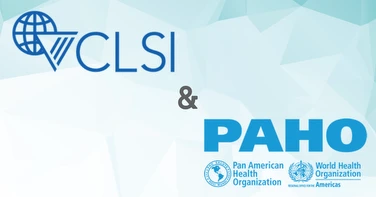You'll receive the latest updates on new standards, guidelines, and educational resources, as well as expert insights to help enhance your laboratory's performance and compliance.
Pan American Health Organization Recognizes Clinical and Laboratory Standards Institute as an Official Non-State Actor

Malvern, Pennsylvania, USA—The Clinical and Laboratory Standards Institute (CLSI) announces that the Pan American Health Organization (PAHO) Member States have admitted CLSI into official relations as a non-state actor with PAHO for a period of three years (2022-2024). PAHO acts as the Regional Office for the Americas of the World Health Organization (WHO).
“Official relations” is a privilege that PAHO’s executive committee grants to eligible organizations that have sustained and systematic engagement with PAHO to extend the reach of the Organization’s actions. PAHO engages with non-state actors in view of their significant role in global health.
CLSI is a not-for-profit organization that develops and promotes laboratory standards worldwide. CLSI publishes best practice standards, guidelines, and products for use by medical laboratories, the device manufacturing community, and government health agencies to ensure the integrity and accuracy of test results—leading to better patient outcomes.
“The work that CLSI does globally to promote the use of our standards to ensure the integrity of testing results, has been critical in the response to COVID-19, HIV, and monkeypox in developing countries,” said Patrick Mateta, Vice President for Global Health Programs (GHP). “This designation affords CLSI, through its Global Health programs, the opportunity to expand its activities to the Americas and Caribbean regions where PAHO is heavily invested.”
To advance these goals, PAHO promotes technical cooperation between countries and works in partnership with ministries of health and other government agencies, civil society organizations, other international agencies, universities, social security agencies, community groups, and other partners. The organization's members represent 51 countries and territories in the region. Under their leadership, PAHO sets regional health priorities and mobilizes action to address health problems that respect no borders and that often jeopardize the sustainability of health systems.
“CLSI is uniquely positioned to help laboratories around the world bring quality standards and best practices into their operations. With over 1400 volunteer experts in the field of laboratory medicine and diagnostics, we develop and promote the standards that touch the lives of every person who receives a diagnosis—or cares about someone that does.” said Barb Jones, CEO of CLSI. “PAHO’s recognition of CLSI’s importance for public health in the Americas region will enable us to bring this expert knowledge to people as never before.”
For more information about CLSI’s training programs, contact CustomerService@clsi.org or +1.610.688.0100.
CLSI sets the standard for quality in medical laboratory testing. A not-for-profit membership organization, CLSI brings together the global laboratory community for the advancement of a common cause: to foster excellence in laboratory medicine.
For over 50 years, our members, volunteers, and customers have made CLSI a respected, transformative leader in the development and implementation of medical laboratory testing standards. Through our unified efforts, we will continue to set and uphold the standards that drive quality test results, enhance patient care delivery, and improve health care around the world.
By using CLSI standards, laboratorians can improve process quality, speed the development of standard operating procedures, and implement safer practices with greater ease and efficiency.